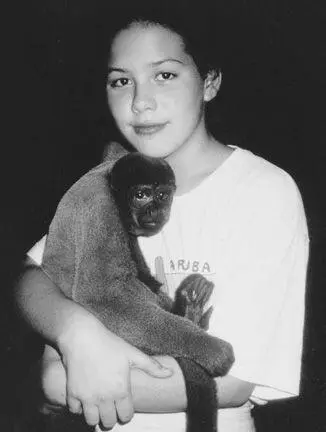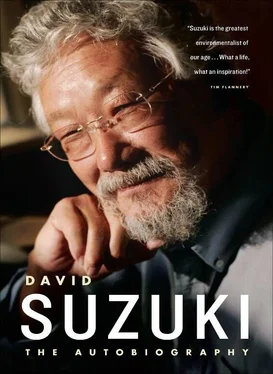In Canada, we live the privileged life with plenty of food, water and shelter; we have watches, bicycles, computers, and television sets.
Two days ago here in Brazil, we were shocked when we spent time with some children living on the streets, and here is what one child told us: “I wish I was rich, and if I were, I would give all the street children food, clothes, medicine, shelter, love, and affection.”
If a child on the street who has nothing is willing to share, why are we who have everything still so greedy?
I can't stop thinking that these are children my own age, that it makes a tremendous difference where you are born.
I could be one of those children living in the favelas of Rio, I could be a child starving in Somalia, a victim of war in the Middle East, or a beggar in India.
I'm only a child yet I know if all the money spent on war was spent on ending poverty, making treaties and finding environmental answers, what a wonderful place this Earth would be.
At school, even in kindergarten, you teach us how to behave in the world — you teach us not to fight with others; to work things out; to respect others; to clean up our mess; not to hurt other creatures; to share, not be greedy.
Then why do you go out and do the things you tell us not to do?
Do not forget why you are attending these conferences, who you are doing this for — we are your own children.
You are deciding what kind of a world we will grow up in.
Parents should be able to comfort their children by saying, “Everything's going to be all right,” “We're doing the best we can,” and “It's not the end of the world.”
But I don't think you can say that to us anymore.
Are we even on your list of priorities?
My dad always says, “You are what you do, not what you say.”
Well, what you do makes me cry at night.
You grown-ups say you love us, but I challenge you, please make your actions reflect your words. Thank you.
I was absolutely floored. It was a powerful speech, delivered with eloquence, sincerity, and passion. The audience was electrified. All of the presentations in the convention hall were broadcast on monitors throughout the building, and I am told that when Sev began to speak, people stopped what they were doing and gathered around the television sets to listen to her. Severn received one of only two standing ovations given during the entire conference (the other was for President Fidel Castro of Cuba, who also gave a powerful speech).
When she left the stage to come to us near the middle of the auditorium, her first words to Tara were, “Mommy, could you hear my heart beating?” As she sat down between us, a member of the American delegation rushed over to shake her hand and congratulate her. “That was the best speech anyone has given here,” U.S. senator Al Gore told her.
The speech was filmed and is archived with the United Nations. I have a copy of it and have shown the video dozens of times to audiences attending my talks; each time, I am moved by its simplicity and power. The repercussions of that speech had a huge impact on Sev's life. Canadian journalist and human-rights activist Michelle Landsberg wrote a column about it, and the speech has been printed verbatim in dozens of articles and translated into several languages. John Pierce of Doubleday contacted Severn about writing a book based on it, which she did in 1993; the book is called Tell the World . She was interviewed again and again, offered opportunities to host television programs, and invited to give speeches. She received the United Nations Environment Program's Global 500 award in Beijing in 1993.
It was all pretty heady stuff for a twelve-year-old, and I began to worry about what this would do to her sense of herself. I stopped worrying the next year, when she was invited to appear on The Joan Rivers Show in New York. “Dad,” Sev told me, “I hope it's okay, but I'm not going to do this. I have to study, and I want to make the basketball team.” She had her priorities right.
AGENDA 21 IS THE 700-page tome adopted by 178 governments at Rio; essentially, it was a blueprint for the world to achieve sustainable development. The cost of this massive shift from a focus on the economy above all else to an inclusion of environmental factors was estimated to be $600 billion a year, although the cost of not doing anything was not estimated and would have been many times greater. The developing world was expected to put up $450 billion of it, a sum that represented 8 percent of their collective gross domestic product (GDP), and the industrialized nations were expected to cough up the remainder, a mere 0.7 percent of their GDPs. Before the Earth Summit was over, developed countries were already complaining that their contribution was impractical, and the target of 0.7 percent of GDP has not been reached by any of the major industrial nations such as the United States, Canada, and Australia, even though the goals set in Rio in 1992 were re-affirmed at the Johannesburg Earth Summit in 2002.

Sev and woolly monkey at the Ariau Jungle Towers on the Amazon
FOURTEEN
PAPUA NEW GUINEA
IN 1992, A MAN who was working in Papua New Guinea asked if he could drop by my house in Vancouver. Shortly after he arrived, Nick Fogg asked to go to the bathroom and stayed there for an inordinately long time, audibly ill. When he emerged, gray and weak, he told me he was having a malarial flare-up. Nevertheless, he managed to ask me whether I'd be interested in visiting the South Pacific country.
Nick worked for CUSO (formerly Canadian University Services Overseas and still known by the old acronym), a nongovernmental international developmental organization, and despite his alarming condition, I was immediately interested because I'd heard so much about the island nation from Richard Longley, the main researcher for the television series Science Magazine .
Richard was trained in England as a botanist and had taught for a number of years in Papua New Guinea. Long before I became involved in the TV program The Nature of Things , he was the contact person for CBC producer Nancy Archibald when she made a film there for that series. Richard eventually moved to Toronto, where he was hired to do research for the new series Science Magazine . In that capacity, he visited the University of British Columbia, where he interviewed me, and later I ended up being asked to host the show.
I had seen Nancy's program on Papua New Guinea, which showed some of the incredible variety of people and animals living on the island of New Guinea north of Australia. To bird-watchers, Papua New Guinea is famous for its fabled birds of paradise. I was thrilled with Nick's invitation, and I made the visit to Papua New Guinea in 1993. It is an awesome place, more than 80 percent of it covered with high mountains and deep valleys. At one point we flew into a large valley, where I could see five airstrips carved into the hills within a six-mile radius; the villages they serve are only a few minutes apart by air, but the valleys and dense forest between them take days to cover on foot. The isolation imposed by the rugged terrain has resulted in a profusion of cultures and over seven hundred languages, about 45 percent of the world's total.
Not long ago, neighboring tribes raided each other and practiced cannibalism, which perpetuated a terrible disease called kuru, for years thought to be hereditary. Famed population geneticist Theodosius Dobzhansky wrote a paper in Science magazine describing kuru as a disease caused by a dominant gene. However, Stanley Prusiner had earned a Nobel Prize in 1997 by showing that kuru was caused by a “slow virus” related to the prions causing BSE (mad cow disease) and the human counterpart, Creutzfeldt-Jakob disease. Kuru, or “laughing disease,” was so named because its victims suffered facial muscle contractions that gave the appearance of a grotesque smile.
Читать дальше



![David Jagusson - Devot & Anal [Hardcore BDSM]](/books/485905/david-jagusson-devot-anal-hardcore-bdsm-thumb.webp)









